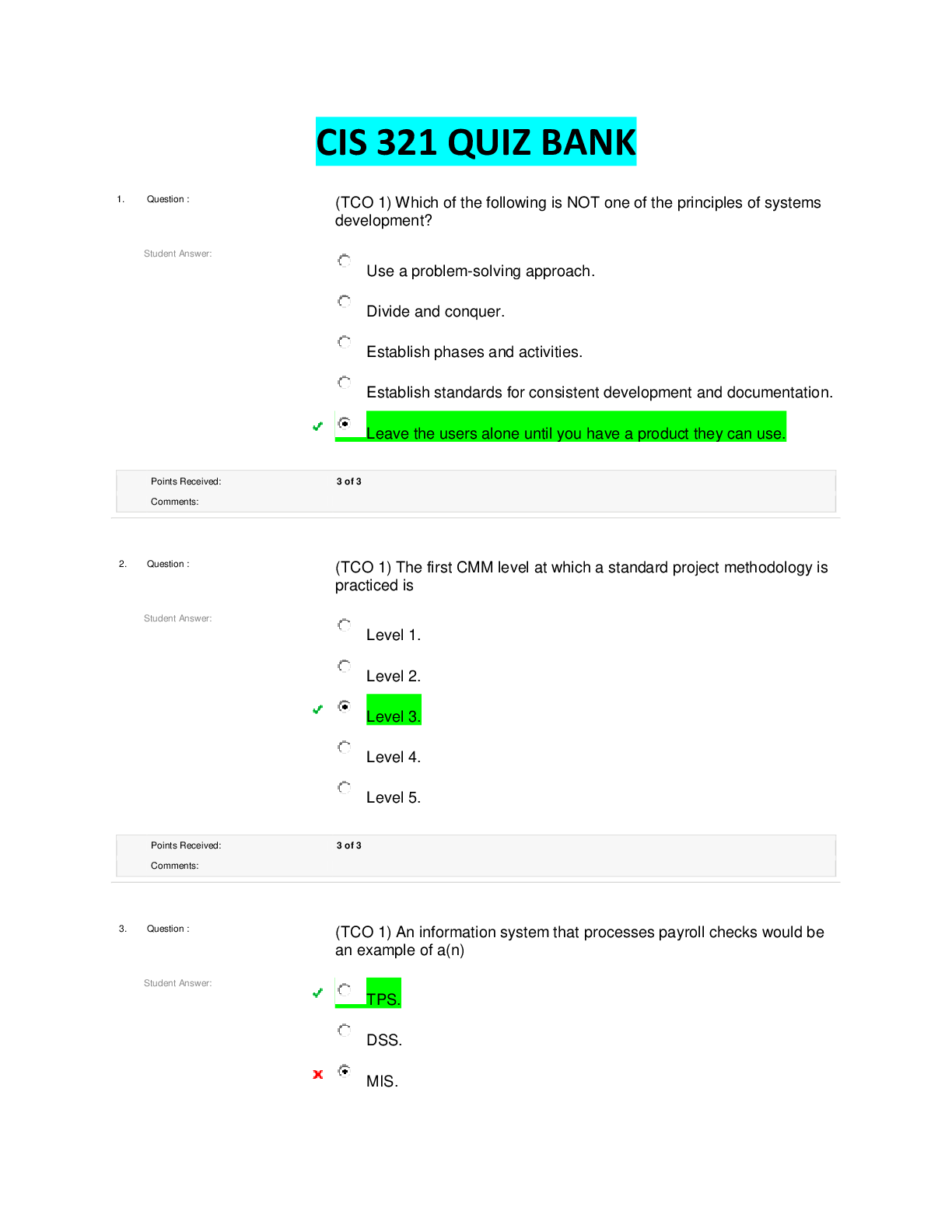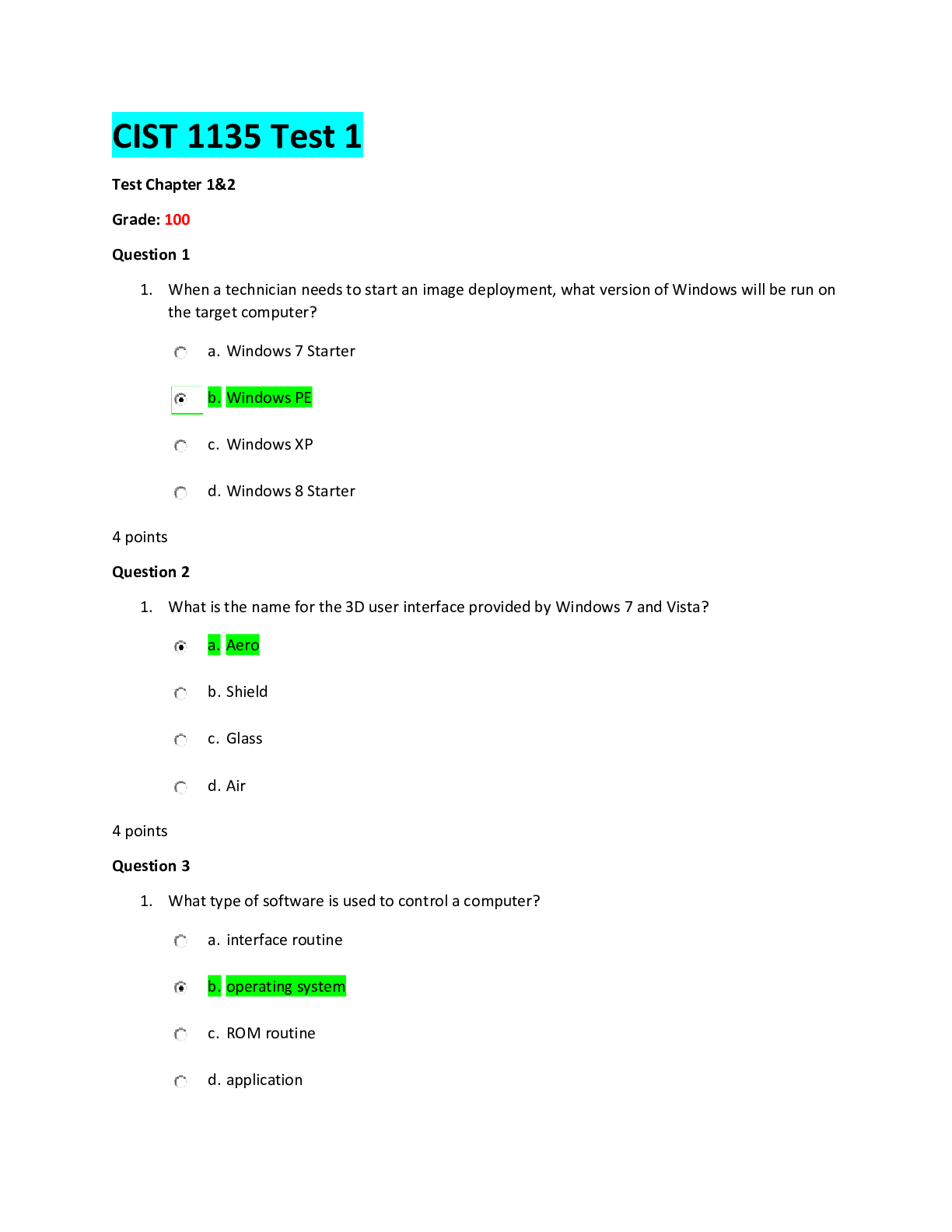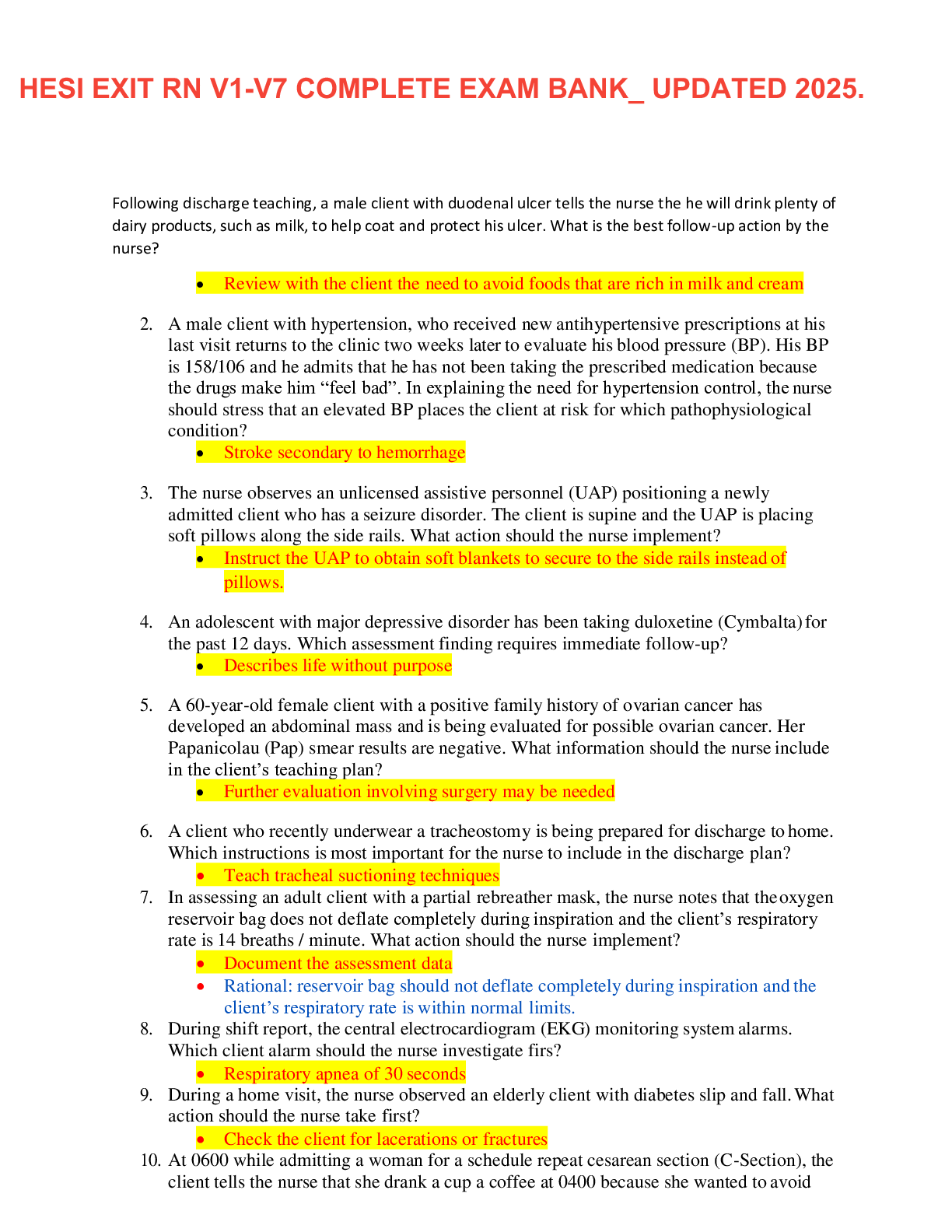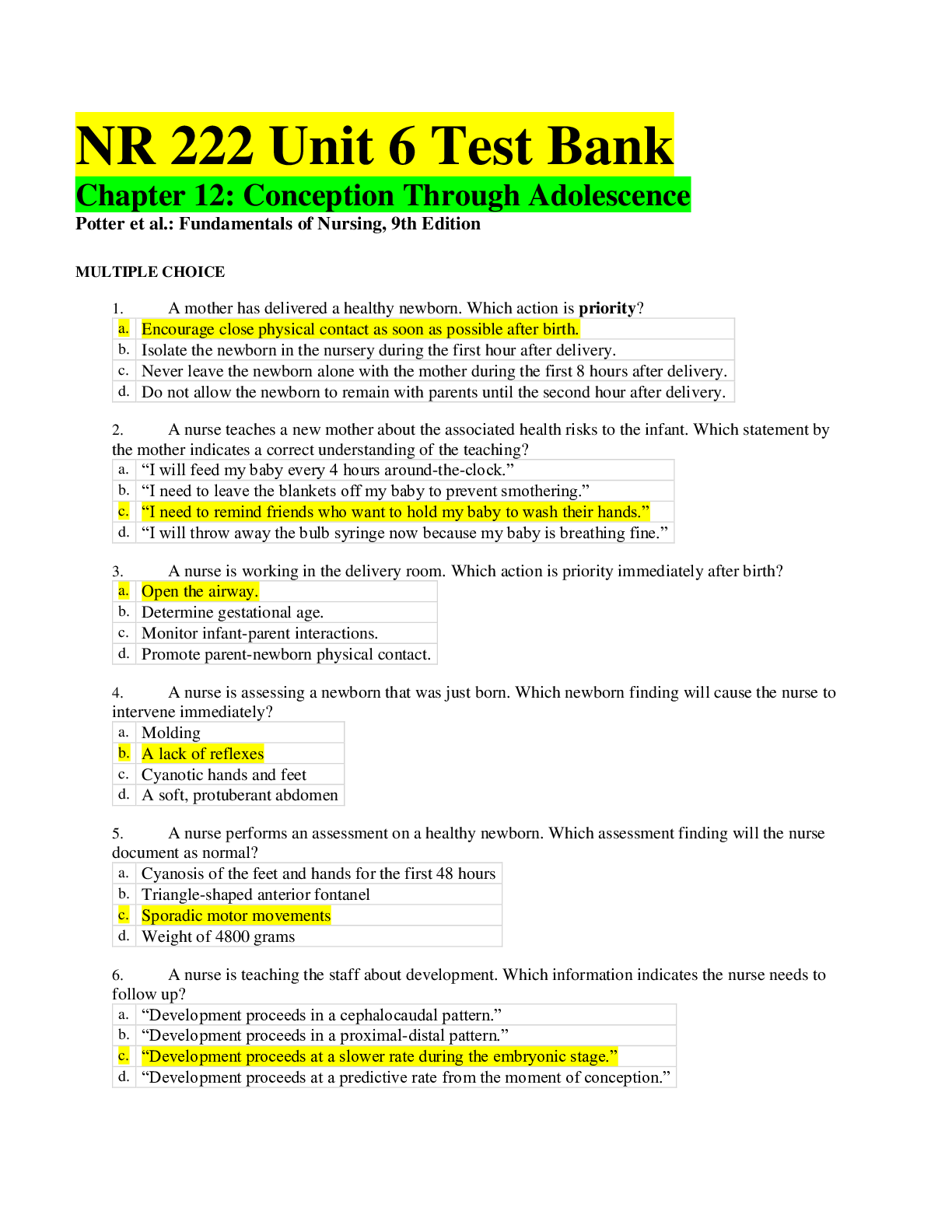*NURSING > QUESTIONS & ANSWERS > Orientation to Pharmacology Nursing Questions & Answers Test Bank (All)
Orientation to Pharmacology Nursing Questions & Answers Test Bank
Document Content and Description Below
The nurse is teaching a patient how a medication works to treat an illness. To do this, the nurse will rely on knowledge of which topic? a. Clinical pharmacology b. Drug efficacy c. Pharmacokineti... cs d. Pharmacotherapeutics ANS: D Pharmacotherapeutics is the study of the use of drugs to diagnose, treat, and prevent conditions. Clinical pharmacology is concerned with all aspects of drug-human interactions. Drug efficacy measures the extent to which a given drug causes an intended effect. Pharmacokinetics is the study of the impact of the body on a drug. PTS: 1 DIF: Cognitive Level: Comprehension REF: p. 1 TOP: Nursing Process: Implementation MSC: NCLEX Client Needs Category: Physiologic Integrity: Pharmacologic and Parenteral Therapies 2. What is a desired outcome when a drug is described as easy to administer? a . It can be stored indefinitely without need for refrigeration. b . It does not interact significantly with other medications. c.It enhances patient adherence to the drug regimen. d . It is usually relatively inexpensive to produce. ANS: C A major benefit of drugs that are easy to administer is that patients taking them are more likely to comply with the drug regimen. Drugs that are easy to give may have the other attributes listed, but those properties are independent of ease of administration. PTS: 1 DIF: Cognitive Level: Comprehension REF: p. 2 TOP: Nursing Process: Assessment MSC: NCLEX Client Needs Category: Physiologic Integrity: Pharmacologic and Parenteral Therapies 3. A patient tells the nurse that an analgesic he will begin taking may cause drowsiness and will decrease pain up to 4 hours at a time. Based on this understanding of the drug’s effects by the patient, the nurse will anticipate which outcome? a. Decreased chance of having a placebo effect b. Decreased motivation to take the drug c. Improved compliance with the drug regimen d. Increased likelihood of drug overdose ANS: C A drug is effective if it produces the intended effects, even if it also produces side effects. Patients who understand both the risks and benefits of taking a medication are more likely to comply with the drug regimen. PTS: 1 DIF: Cognitive Level: Comprehension REF: p. 2 TOP: Nursing Process: Evaluation MSC: NCLEX Client Needs Category: Physiologic Integrity: Pharmacologic and Parenteral Therapies MULTIPLE RESPONSE 1. What are the properties of an ideal drug? (Select all that apply.) o test PDF Combine only a. Irreversible action b. Predictability c. Ease of administration d. Chemical stability e. A recognizable trade name ANS: B, C, D In addition to predictability, ease of administration, and chemical stability, other properties include a reversible action so that any harm the drug may cause can be undone and a simple generic name, because generic names are usually complex and difficult to remember and pronounce. PTS: 1 DIF: Cognitive Level: Comprehension REF: pp. 1-2 TOP: Nursing Process: Assessment MSC: NCLEX Client Needs Category: Physiologic Integrity: Pharmacologic and Parenteral Therapies 2. Before administering a medication, what does the nurse need to know to evaluate how individual patient variability might affect the patient’s response to the medication? (Select all that apply.) a. Chemical stability of the medication b. Ease of administration c. Family medical history d. Patient’s age e. Patient’s diagnosis ANS: C, D, E The family medical history can indicate genetic factors that may affect a patient’s response to a medication. Patients of different ages can respond differently to medications. The patient’s illness can affect how drugs are metabolized. The chemical stability of the medication and the ease of administration are properties of drugs. PTS: 1 DIF: Cognitive Level: Analysis REF: pp. 3-4 TOP: Nursing Process: Implementation MSC: NCLEX Client Needs Category: Physiologic Integrity: Reduction of Risk Potential o test PDF Combine only Chapter 01: Orientation to Pharmacology Bank TIPLE CHOICE The nurse is teaching a patient how a medication works to treat an illness. To do this, the nurse will rely on knowledge of which topic? a. Clinical pharmacology b. Drug efficacy c. Pharmacokinetics d. Pharmacotherapeutics ANS: D Pharmacotherapeutics is the study of the use of drugs to diagnose, treat, and prevent conditions. Clinical pharmacology is concerned with all aspects of drug-human interactions. Drug efficacy measures the extent to which a given drug causes an intended effect. Pharmacokinetics is the study of the impact of the body on a drug. PTS: 1 DIF: Cognitive Level: Comprehension REF: p. 1 TOP: Nursing Process: Implementation MSC: NCLEX Client Needs Category: Physiologic Integrity: Pharmacologic and Parenteral Therapies What is a desired outcome when a drug is described as easy to administer? a. It can be stored indefinitely without need for refrigeration. b. It does not interact significantly with other medications. c. It enhances patient adherence to the drug regimen. d. It is usually relatively inexpensive to produce. ANS: C A major benefit of drugs that are easy to administer is that patients taking them are more likely to comply with the drug regimen. Drugs that are easy to give may have the other attributes listed, but those properties are independent of ease of administration. PTS: 1 DIF: Cognitive Level: Comprehension REF: p. 2 TOP: Nursing Process: Assessment MSC: NCLEX Client Needs Category: Physiologic Integrity: Pharmacologic and Parenteral Therapies A patient tells the nurse that an analgesic he will begin taking may cause drowsiness and will decrease pain up to 4 hours at a time. Based on this understanding of the drug’s effects by the patient, the nurse will anticipate which outcome? a. Decreased chance of having a placebo effect b. Decreased motivation to take the drug c. Improved compliance with the drug regimen d. Increased likelihood of drug overdose o test PDF Combine only ANS: C A drug is effective if it produces the intended effects, even if it also produces side effects. Patients who understand both the risks and benefits of taking a medication are more likely to comply with the drug regimen. PTS: 1 DIF: Cognitive Level: Comprehension REF: p. 2 TOP: Nursing Process: Evaluation MSC: NCLEX Client Needs Category: Physiologic Integrity: Pharmacologic and Parenteral Therapies TIPLE RESPONSE What are the properties of an ideal drug? (Select all that apply.) a. Irreversible action b. Predictability c. Ease of administration d. Chemical stability e. A recognizable trade name ANS: B, C, D In addition to predictability, ease of administration, and chemical stability, other properties include a reversible action so that any harm the drug may cause can be undone and a simple generic name, because generic names are usually complex and difficult to remember and pronounce [Show More]
Last updated: 2 years ago
Preview 1 out of 838 pages
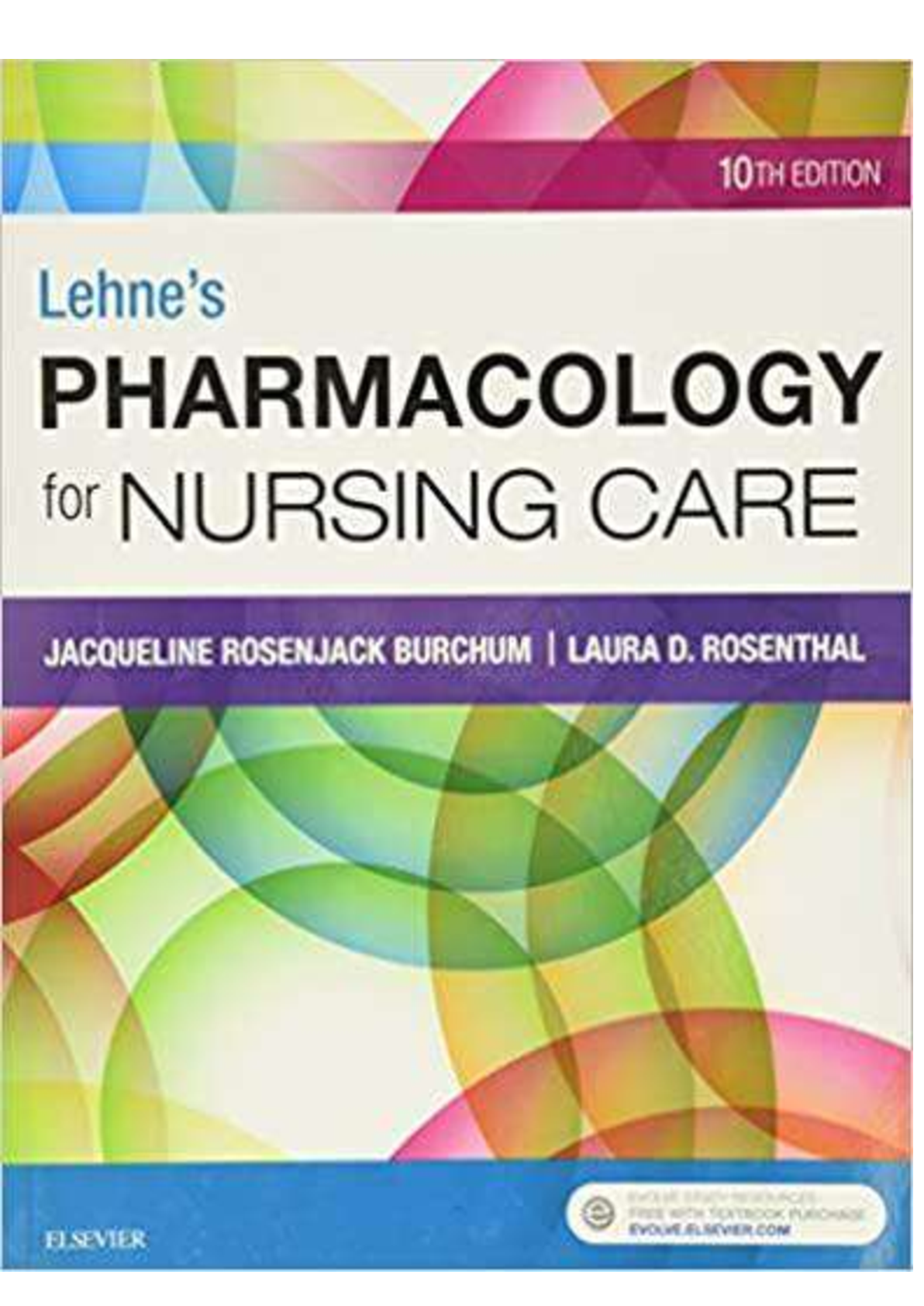
Buy this document to get the full access instantly
Instant Download Access after purchase
Buy NowInstant download
We Accept:

Reviews( 0 )
$7.50
Can't find what you want? Try our AI powered Search
Document information
Connected school, study & course
About the document
Uploaded On
May 03, 2022
Number of pages
838
Written in
Additional information
This document has been written for:
Uploaded
May 03, 2022
Downloads
0
Views
69


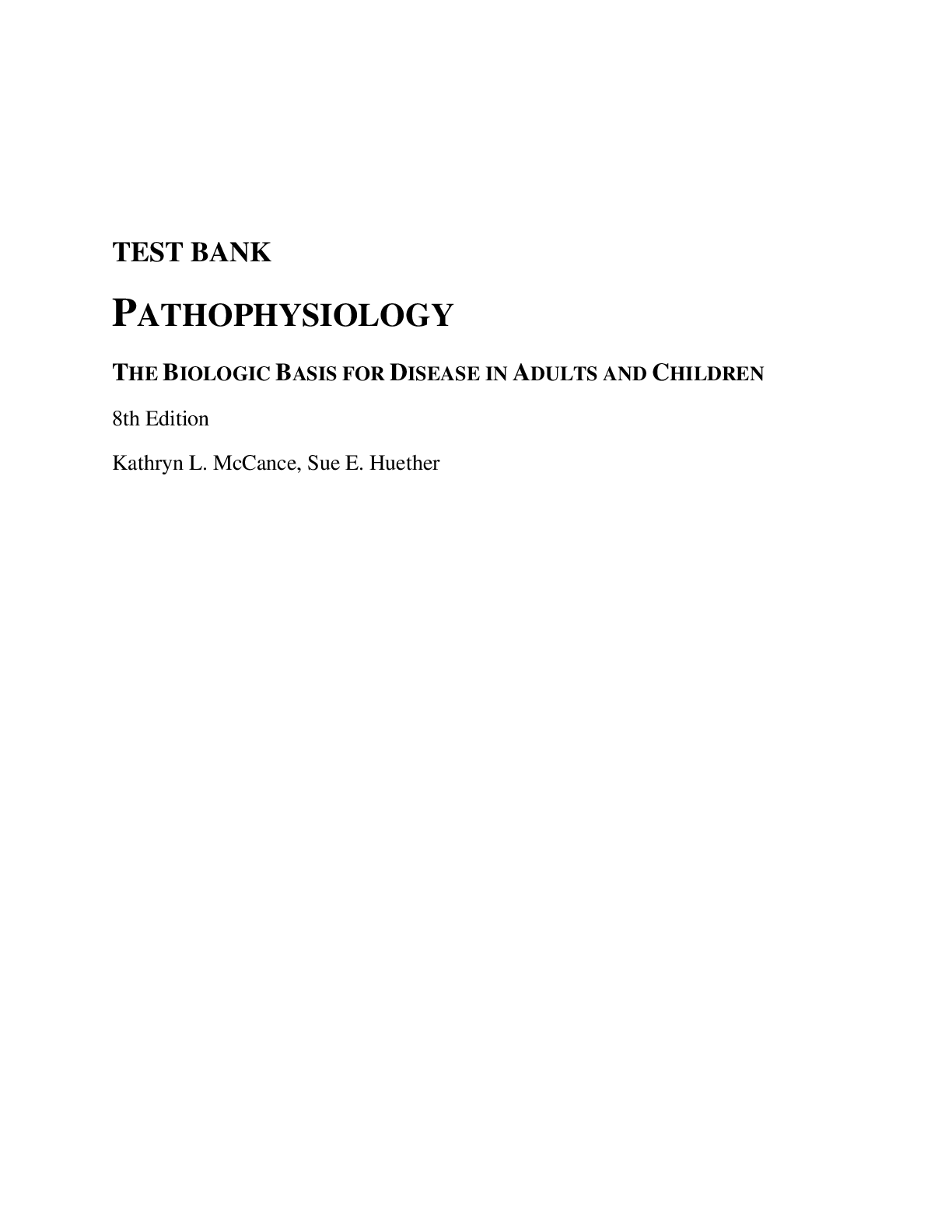

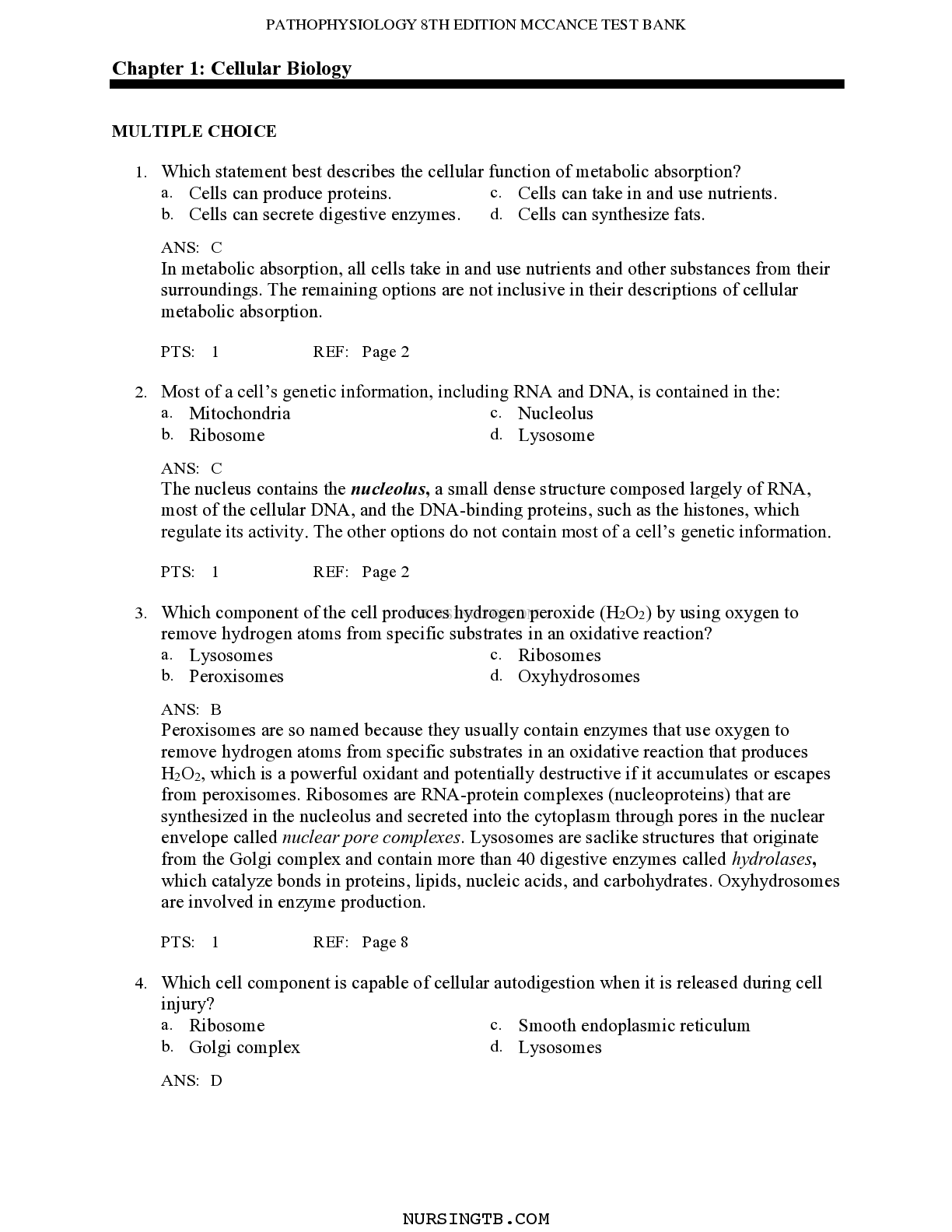
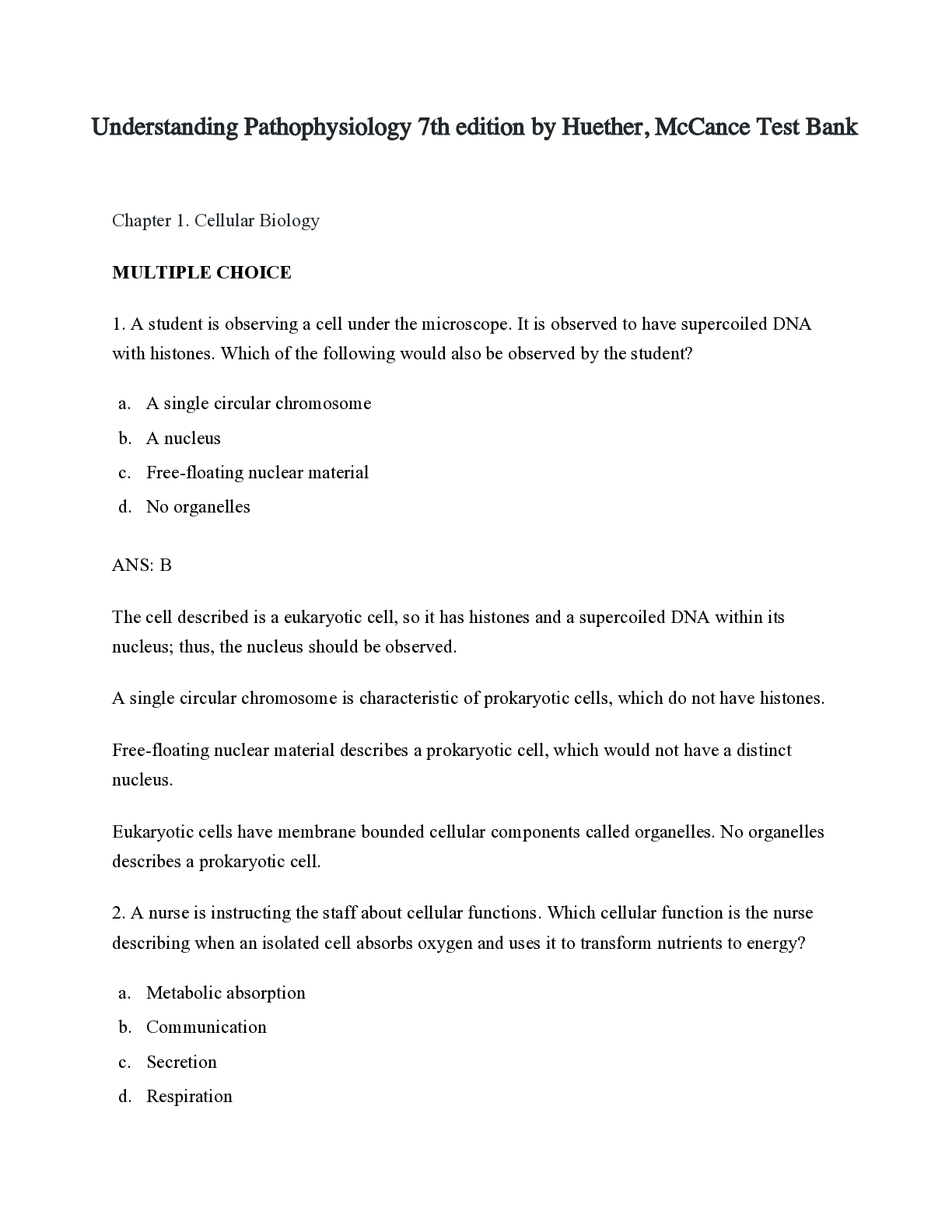
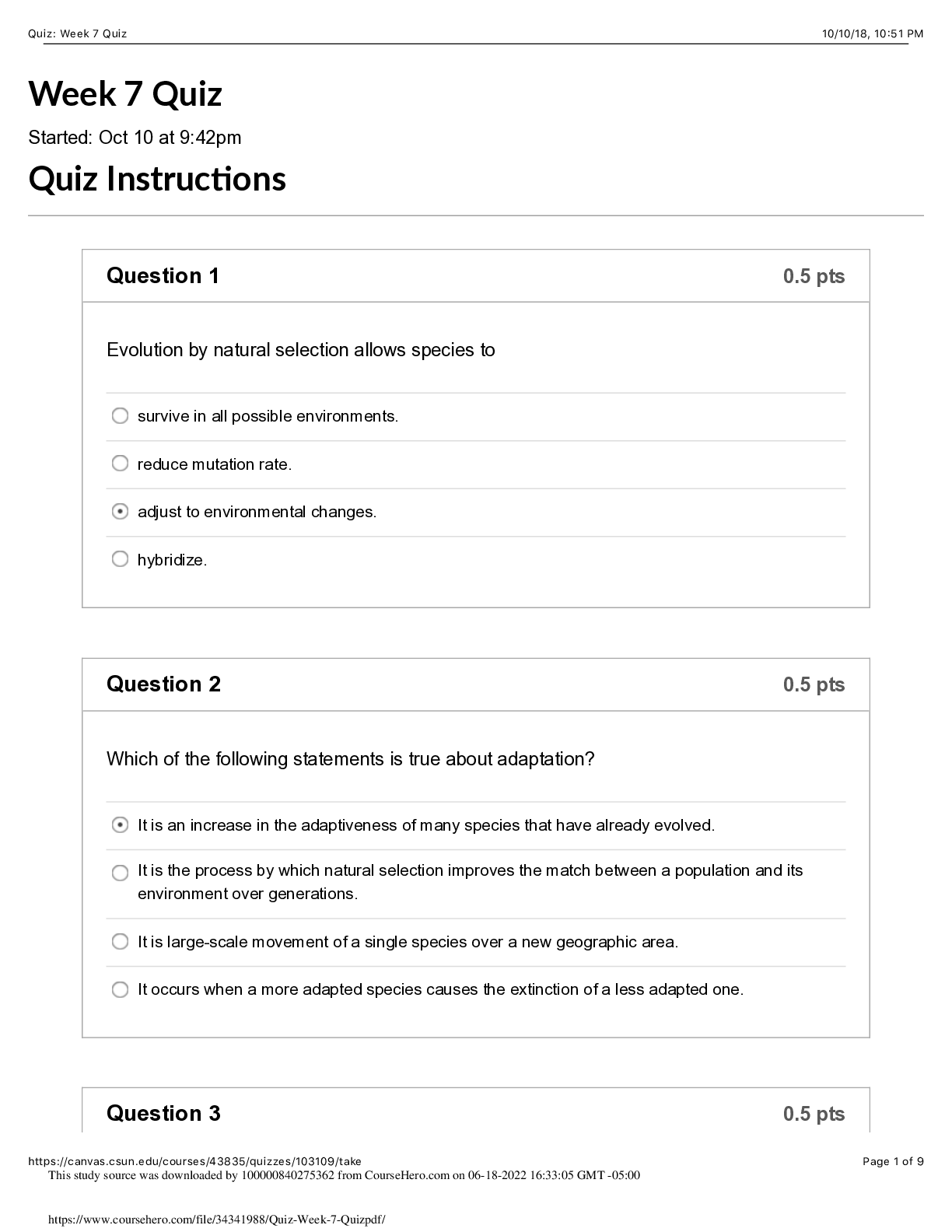
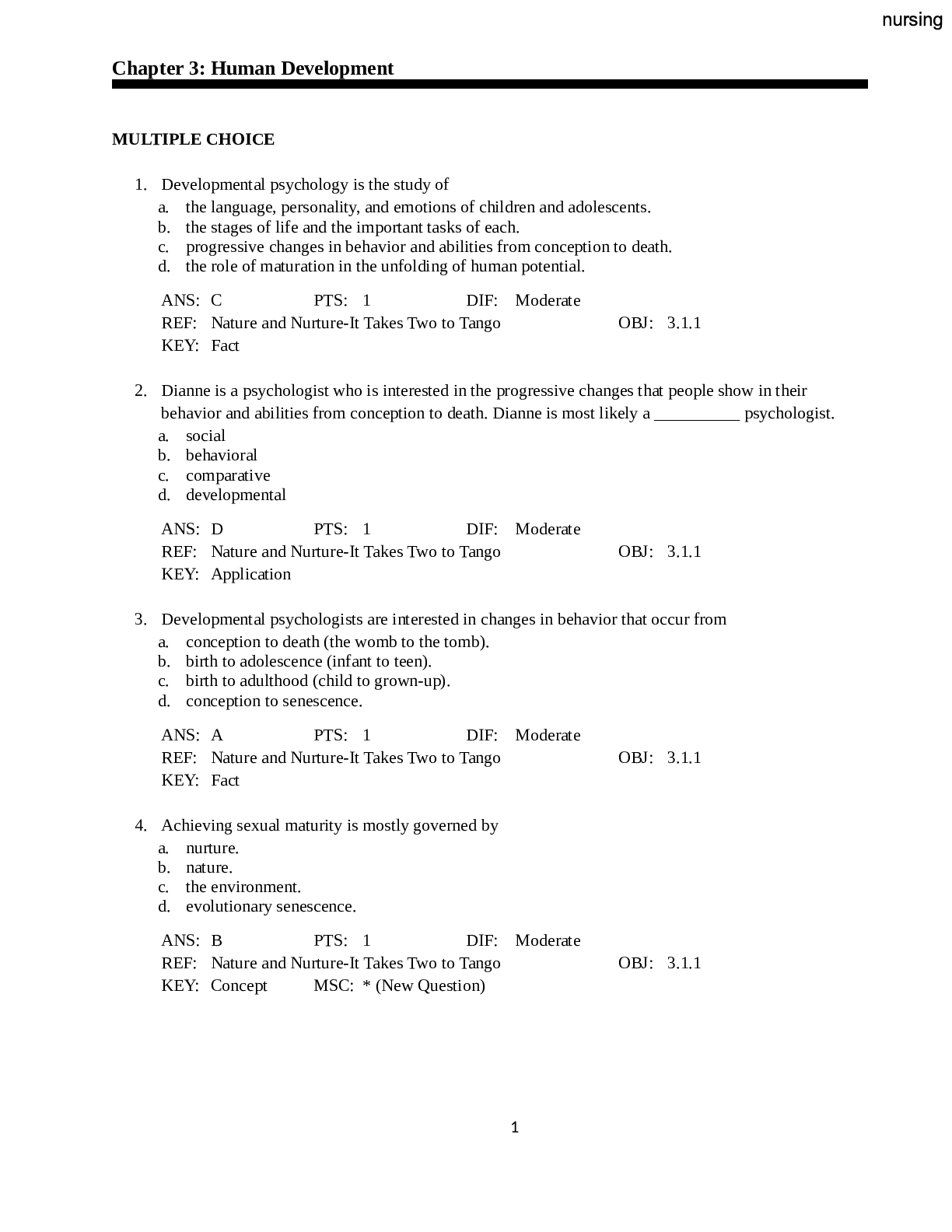

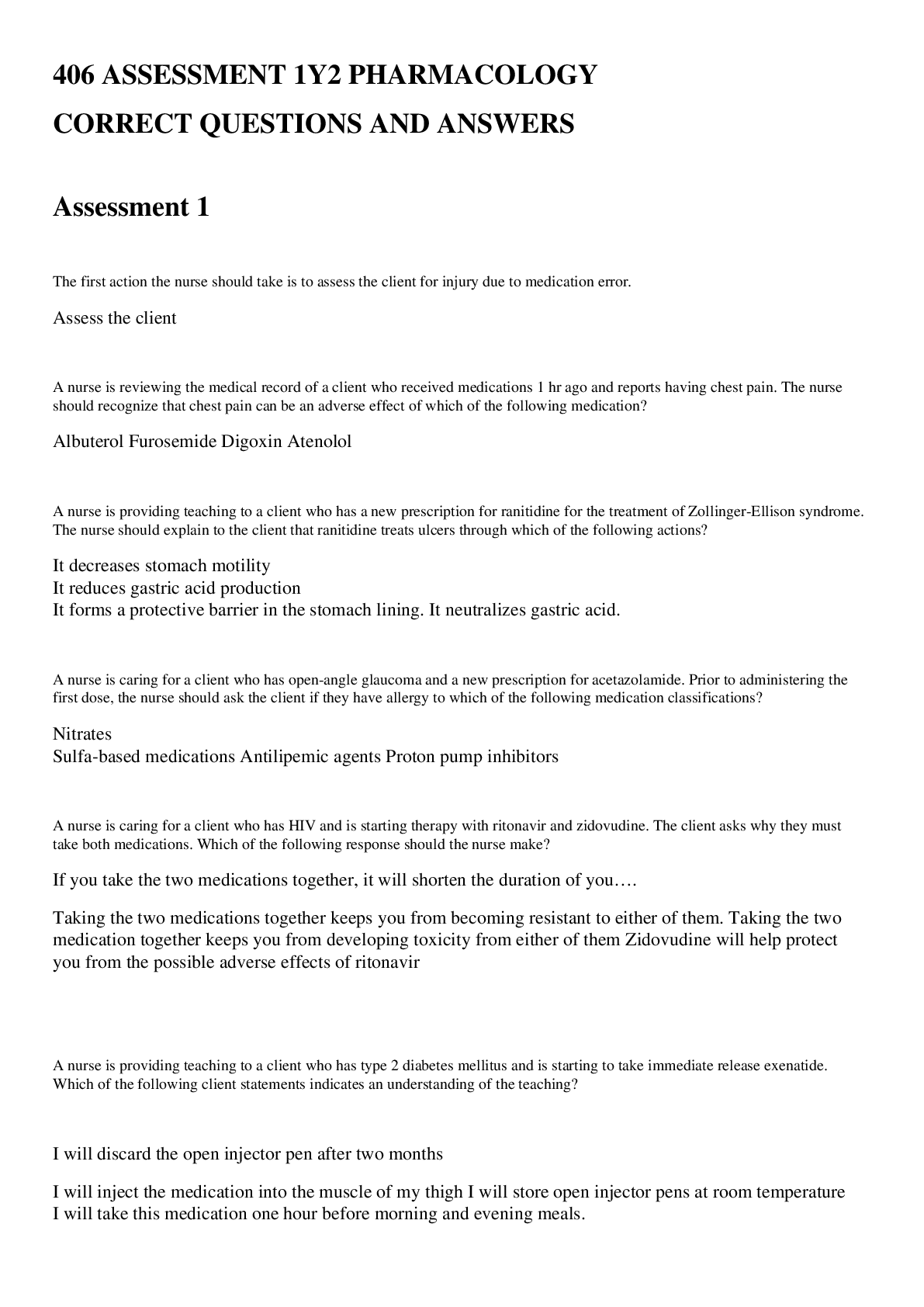
.png)



